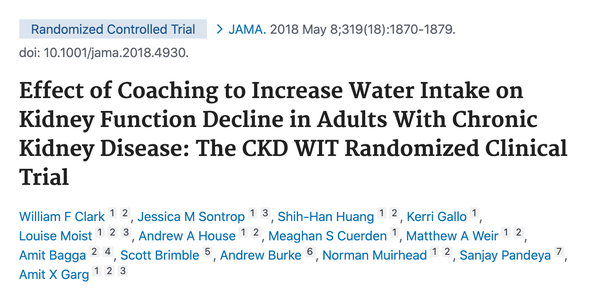Clark W.F. et al. 2018
Effect of Coaching to Increase Water Intake on Kidney Function Decline in Adults With Chronic Kidney Disease: The CKD WIT Randomized Clinical Trial
Abstract
Importance:
In observational studies, increased water intake is associated with better kidney function.
Objective:
To determine the effect of coaching to increase water intake on kidney function in adults with chronic kidney disease.
Design, setting, and participants:
The CKD WIT (Chronic Kidney Disease Water Intake Trial) randomized clinical trial was conducted in 9 centers in Ontario, Canada, from 2013 until 2017 (last day of follow-up, May 25, 2017). Patients had stage 3 chronic kidney disease (estimated glomerular filtration rate [eGFR] 30-60 mL/min/1.73 m2 and microalbuminuria or macroalbuminuria) and a 24-hour urine volume of less than 3.0 L.
Interventions:
Patients in the hydration group (n = 316) were coached to drink more water, and those in the control group (n = 315) were coached to maintain usual intake.
Main outcomes and measures:
The primary outcome was change in kidney function (eGFR from baseline to 12 months). Secondary outcomes included 1-year change in plasma copeptin concentration, creatinine clearance, 24-hour urine albumin, and patient-reported overall quality of health (0 [worst possible] to 10 [best possible]).
Results:
Of 631 randomized patients (mean age, 65.0 years; men, 63.4%; mean eGFR, 43 mL/min/1.73 m2; median urine albumin, 123 mg/d), 12 died (hydration group [n = 5]; control group [n = 7]). Among 590 survivors with 1-year follow-up measurements (95% of 619), the mean change in 24-hour urine volume was 0.6 L per day higher in the hydration group (95% CI, 0.5 to 0.7; P < .001). The mean change in eGFR was -2.2 mL/min/1.73 m2 in the hydration group and -1.9 mL/min/1.73 m2 in the control group (adjusted between-group difference, -0.3 mL/min/1.73 m2 [95% CI, -1.8 to 1.2; P = .74]). The mean between-group differences (hydration vs control) in secondary outcomes were as follows: plasma copeptin, -2.2 pmol/L (95% CI, -3.9 to -0.5; P = .01); creatinine clearance, 3.6 mL/min/1.73 m2 (95% CI, 0.8 to 6.4; P = .01); urine albumin, 7 mg per day (95% CI, -4 to 51; P = .11); and quality of health, 0.2 points (95% CI, -0.3 to 0.3; P = .22).
Conclusions and relevance:
Among adults with chronic kidney disease, coaching to increase water intake compared with coaching to maintain the same water intake did not significantly slow the decline in kidney function after 1 year. However, the study may have been underpowered to detect a clinically important difference.
Trial registration: clinicaltrials.gov Identifier: NCT01766687.
Other abstracts you could be interested in...
- Kavouras S.A. et al. 2021, Urine osmolality predicts calcium-oxalate crystallization risk in patients with recurrent urolithiasis
- Adams JD et al. 2021, Combining urine color and void number to assess hydration in adults and children
- Brunkwall et al. 2020, High water intake and low urine osmolality are associated with favorable metabolic profile at a population level: low vasopressin secretion as a possible explanation
- Perrier E. et al. 2015, Twenty-Four-Hour Urine Osmolality as a Physiological Index of Adequate Water Intake
